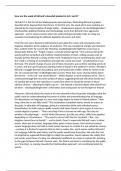Essay
Richard II - The initial seeds of Richard's downfall
This essay is graded A* (92%, 23/25) A Level offering in depth critical analysis of quotes with a perceptive understanding of Richard II's impending downfall. It also includes insightful points on the play's sense of foreboding and symbolism, Shakespeare's narrative and pace providing astute close ...
[Show more]




